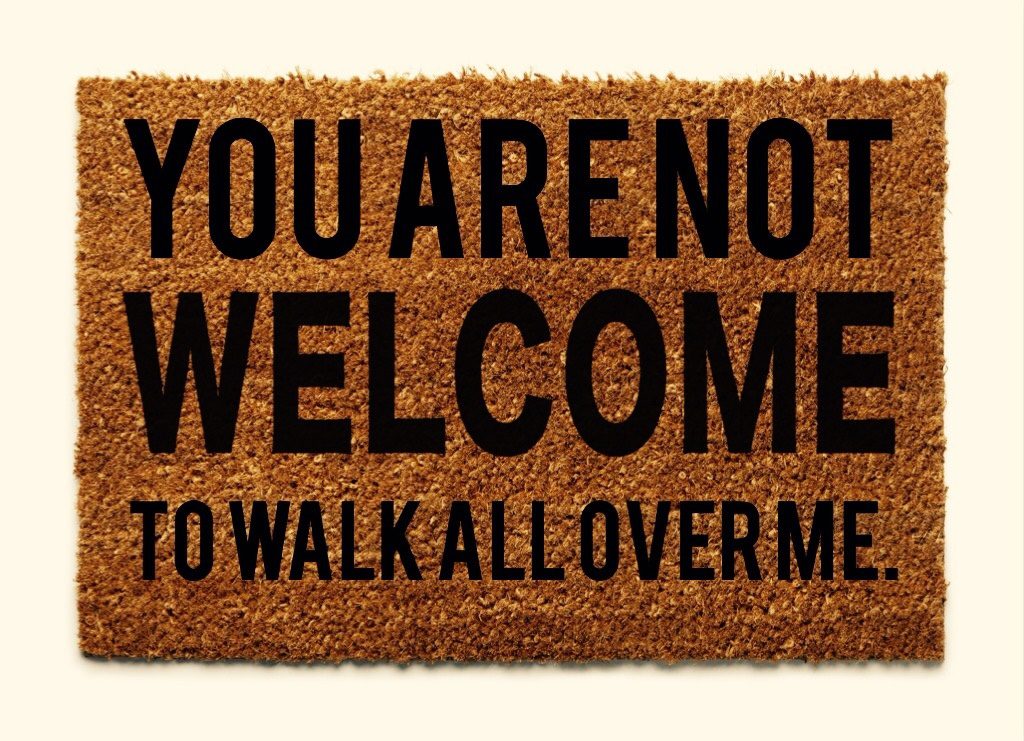Psychologist Harriet Braiker calls approval-seeking behavior “the disease to please” because it’s just another form of addiction. If you allow people to walk all over you, you have essentially become a doormat because you have put their needs above your own.
However, this type of compulsive behavior can take a serious toll on your mental and physical health. Julie Exline, a licensed psychologist, says that sociotropy, or people-pleasing, can even lead to depression because you ignore your own needs to accommodate other’s desires.
If you have trouble getting rid of these deep-seated tendencies to please other people at any cost, use the following tips to give you some guidance.
Here are 5 Ways to Stop Being Someone’s Doormat:
1. Assert yourself more.
People pleasing behavior begins in childhood, when parents praise a child for obeying them but discourage him or her from asserting themselves, according to Jay Earley, author of Finding Your Life Purpose. Impressionable children perceive this as a threat, because they believe that in order to feel loved, they must please others and do as they’re told. Otherwise, they will be shunned and scolded for realizing their own needs have not been met by blindly following others orders.
To break this cycle, simply start to voice your own needs more often. If friends want you meet up with them after you’ve had a long, tiring workweek, tell them you need some time to rest but that you’ll catch up with them soon. You can still be polite without being a total doormat. Indeed, there IS a middle ground. Good friends will understand and not give you a hard time about it; if they do, then you should consider finding a different group of friends.
You have to start thinking of your own needs, because otherwise, who will? Remember, other people’s reactions have nothing to do with you, so don’t take responsibility for them. You should never have to bend over backwards to please others at the expense of your own well-being.
2. Practice saying ‘no.’
People pleasers never want to say no in fear of losing or disappointing the other person. Again, this belief often stems from childhood when the parents reinforced compliance but reprimanded the child when he or she didn’t listen to authority. Regardless of what you’ve been raised to think, saying yes to everyone and everything will only leave you exhausted, stressed, and unfulfilled. If you use all your time to tend to the needs of others, when will you have time to cater to your own requirements? You won’t.
You matter just as much as other people around you, so don’t fall victim to self-sacrificing behavior just to avoid ruffling other people’s feathers. Notice how it feels to finally stand up for yourself, even if the other person seems annoyed or outraged at your response – you will likely feel a huge weight drop off your shoulders and even gain confidence from your newfound decisiveness. Agreeing to everything someone asks of you will leave you overworked, worn out, and full of resentment.
“No” doesn’t mean you don’t care about someone else’s wishes – it just means you value yourself and others enough to be honest about what you can and can’t handle.
3. Reflect on why you feel the need to please others.
Maybe you need to go deep within and get rid of old skeletons in your closet that still haunt you from your childhood. Only you can detach yourself from heavy history, so do what needs to get done in order to move on and live a balanced, healthy life. Realize that just because your parents raised you to act a certain way doesn’t mean you have to comply now.
While it can be difficult to discard heavily ingrained beliefs, taking that first step and reflecting on why you behave in certain ways will help you lift that heavy fog and see yourself clearly.
Remember that you determine your relationship with other people, so if you never stand up for yourself, they will assume that they can get whatever they want out of you at no cost. While this isn’t entirely your fault, you can prevent this from happening in the future by developing your self-worth and casting out your deep-rooted demons.
4. Think before you speak.
Anytime someone asks you for something or wants your opinion, don’t blurt out an answer just to appease them. Actually let the words sink in and listen to the person thoroughly before you offer a response. If someone asks you for a commitment on the spot, tell them you will check your calendar and get back with them. This way, you can see if you really have time to meet their request or not.
In the same way, if someone wants your opinion about an important subject, say what you really think, not just what they want to hear. People will actually respect you more for your transparency rather than just robotically agreeing with their every thought.
You have a voice for a reason – use it to express your honest thoughts no matter what others may think. You don’t have to babysit other’s emotions; they must take ownership of their own thoughts and feelings.
5. Practice self-love.
People pleasers often have very low self-esteem, and become addicted to fulfilling other’s desires to make themselves feel better. In reality, acting as a doormat for others is selfish, because you use others to boost your own self-worth. You should want to help others because it’s the right thing to do, not to bolster your self-esteem. To remedy this, make sure you cultivate love within yourself so that you will attract loving, supportive people into your life who won’t try to take advantage of your kindness. Love yourself now, as you are at this moment, and your self-worth will slowly increase as you shed negative thoughts about yourself. Then, you can stop being a doormat!












 Community
Community

